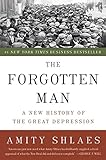Tim W. Brown is the author of three novels; his latest, Walking Man, was published in April 2008 by Bronx River Press. He serves on the board of the New York Center for Independent Publishing, and he regularly reviews small-press books as a member of the National Book Critics Circle. His next novel is American Renaissance, due in 2010 from Gival Press.
I have pretty circumscribed habits when it comes to reading, which generally consist of (1) reading books as part of research for my writing projects and (2) reading books I’ve been assigned to review. 2008 was a typical year for me.

 My current writing project is a novel set in the 1930s, and I’ve spent about two years thus far reading background material for the book. That’s not to say the books I’ve read don’t have contemporary relevance. Given the current economic climate, two histories I’ve read are eerily prescient. The Forgotten Man: A New History of the Great Depression by Amity Shlaes focuses on FDR’s experiments to turn the economy around during the Great Depression. She argues that his administration’s policies hurt as well as helped the cause. Her discussions of the freezing of capital markets and deflation, two terms we read in the newspapers today, explain what potential dangers loom ahead of us. American-Made: The Enduring Legacy of the WPA by Nick Taylor traces the history of FDR’s extremely ambitious Works Progress Administration, which put millions of unemployed Americans to work. Harry Hopkins, WPA’s head, is the book’s hero; an incredibly bright and scrupulously honest man, he worked harder than anyone to keep workers from all walks of life afloat during the nation’s worst economic downturn. Incoming president Barack Obama, who has announced economic stimulus measures of his own, could learn much from Hopkins’ example.
My current writing project is a novel set in the 1930s, and I’ve spent about two years thus far reading background material for the book. That’s not to say the books I’ve read don’t have contemporary relevance. Given the current economic climate, two histories I’ve read are eerily prescient. The Forgotten Man: A New History of the Great Depression by Amity Shlaes focuses on FDR’s experiments to turn the economy around during the Great Depression. She argues that his administration’s policies hurt as well as helped the cause. Her discussions of the freezing of capital markets and deflation, two terms we read in the newspapers today, explain what potential dangers loom ahead of us. American-Made: The Enduring Legacy of the WPA by Nick Taylor traces the history of FDR’s extremely ambitious Works Progress Administration, which put millions of unemployed Americans to work. Harry Hopkins, WPA’s head, is the book’s hero; an incredibly bright and scrupulously honest man, he worked harder than anyone to keep workers from all walks of life afloat during the nation’s worst economic downturn. Incoming president Barack Obama, who has announced economic stimulus measures of his own, could learn much from Hopkins’ example.
Two notable poetry collections I read for review purposes in 2008 were the National Book Award-nominated Blood Dazzler by Patricia Smith and Annoying Diabetic Bitch by Sharon Mesmer. Smith’s book is a highly moving account of Hurricane Katrina and the devastation it visited upon New Orleans in 2005. Her book is truly heart-wrenching when describing the plight of the storm’s many African-American victims, capturing in dialect their faith in a doubtful deliverance. Blood Dazzler tells a supremely tragic story, but a powerful one, too, affirming that human will and the language expressing it are equal to the worst havoc that Nature can wreak. Mesmer’s book owes its genesis to “flarf” methodology, wherein outrageous and/or inappropriate terms are entered into the Google search engine and poems are composed from the results. In less-practiced hands than Mesmer’s, flarf-derived poems could easily lapse into nonsense. The particular genius of this book lies in how Mesmer draws on the universal Id that is the Internet and creates poems with strong speakers baring their deepest thoughts and desires. Her book is lewd, crude, politically incorrect – and hilarious.









